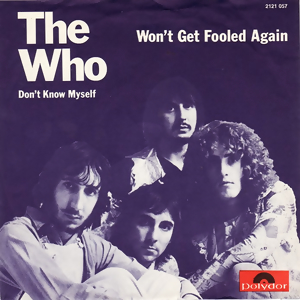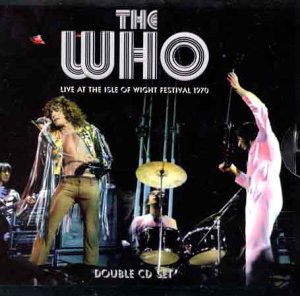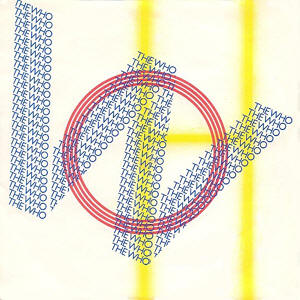
The Who are an English rock band formed in London in 1964. Their classic lineup (1964–1978) consisted of lead vocalist Roger Daltrey, guitarist Pete Townshend, bassist John Entwistle and drummer Keith Moon. They are considered one of the most influential rock bands of the 20th century. Their contributions to rock music include the development of the Marshall stack, large public address systems, the use of synthesizers, Entwistle's and Moon's influential playing styles, Townshend's feedback and power chord guitar technique, and the development of the rock opera. They are cited as an influence by many hard rock, punk, power pop and mod bands. The Who were inducted into the Rock and Roll Hall of Fame in 1990.

Peter Dennis Blandford Townshend is an English musician. He is the co-founder, guitarist, second lead vocalist and principal songwriter of the Who, one of the most influential rock bands of the 1960s and 1970s. His aggressive playing style and poetic songwriting techniques, with the Who and in other projects, have earned him critical acclaim.

Who Are You is the eighth studio album by the English rock band the Who, released on 18 August 1978 by Polydor Records in the United Kingdom and on 21 August 1978 by MCA Records in the United States. Although the album received mixed reviews from critics, it was a commercial success, peaking at number 2 on the US charts and number 6 on the UK charts.
Lifehouse is an unfinished science fiction rock opera by the Who intended as a follow-up to Tommy. It was abandoned as a rock opera in favour of creating the traditional rock album Who's Next, though its songs would appear on various albums and singles by the Who, as well as Pete Townshend's solo albums. In 1978, aspects of the Lifehouse project were revisited by the Who on Who Are You. In 2000, Townshend revived the Lifehouse concept with his set Lifehouse Chronicles and the sampler Lifehouse Elements. On 1 May 2007, he released an online software called The Lifehouse Method in which any "sitter" could create a musical "portrait". The site is now defunct. The artwork and design of the box set was undertaken by designer Laurence Sutherland.

Lifehouse Chronicles is a box set released in 2000 by Pete Townshend with the focus of the box being the formerly "abandoned" Lifehouse rock opera. The set contains song demos by Pete Townshend; including solo versions of "Baba O'Riley", "Won't Get Fooled Again", and "Who Are You", and the Lifehouse Radio Program. The box set release was followed by two Sadler's Wells Lifehouse concerts and the release of a live CD and video/DVD titled, respectively, Pete Townshend Live: Sadler's Wells 2000 and Pete Townshend – Music from Lifehouse.

"Won't Get Fooled Again" is a song by the English rock band the Who, written by guitarist and primary songwriter Pete Townshend. It was released as a single in June 1971, reaching the top 10 in the UK, while the full eight-and-a-half-minute version appears as the final track on the band's 1971 album Who's Next, released that August. In the US, the single entered Billboard on 17 July, reaching No. 15.

Live at the Isle of Wight Festival is a double live album by The Who, recorded at the Isle of Wight Festival on 29 August 1970, and released in 1996. A DVD of the concert was also released for the first time in 1996.
"My Wife" is a song by the English rock band the Who, written and sung by bass guitarist John Entwistle. It was originally released in 1971 on Who's Next and later as the B-side of the single "Baba O'Riley" on 6 November 1971 in Europe by Polydor Records.

"5:15" is a song written by Pete Townshend of British rock band The Who. Part of the band's second rock opera, Quadrophenia (1973), the song was also released as a single and reached No. 20 on the UK Singles Chart, while the 1979 re-release reached No. 45 on the Billboard Hot 100.

"Who Are You" is the title track on the Who's 1978 album, Who Are You, the last album released by the group before Keith Moon's death in September 1978. It was written by Pete Townshend and released as a double-A-sided single with the John Entwistle composition "Had Enough", also featured on the album. The song was one of the band's biggest hits in North America, peaking at number 7 in Canada and at number 14 in the United States, and has become one of the band's signature tunes at their live shows. The piano on the track is played by Rod Argent.

"Love, Reign o'er Me", subtitled "Pete's Theme", is a song by English rock band The Who. Written and composed by guitarist Pete Townshend, it was released on 27 October 1973 as the second single from the band's sixth studio album and second rock opera, Quadrophenia. It is the final song on the album, and has been a concert staple for years. The song peaked at number 76 on the US Billboard Hot 100 and number 54 on Cash Box.

"Athena" is a song written by Pete Townshend and recorded by The Who. It appears as the first track on the group's tenth album It's Hard, released in 1982. Written for actress Theresa Russell, the song was the first single from It's Hard. The single was a moderate success, entering US Billboard on 4 September, reaching No. 28 and the UK Singles Charts on 2 October, reaching No. 40.

"I'm Free" is a song written by Pete Townshend and performed by the Who on the album Tommy. The song has since been released as a single, becoming one of the best known tracks from Tommy.

"Squeeze Box" is a song by the Who from their album The Who by Numbers. Written by Pete Townshend, the lyrics are couched in sexual double entendres. Unlike many of the band's other hits, the song features country-like elements, as heard in Townshend's banjo picking.
The Who Tour 2006–2007 was The Who's first worldwide concert tour since 1997, supporting their Endless Wire album.

"Slip Kid" is a song from the Who's seventh album, The Who by Numbers. Written originally for Pete Townshend's shelved Lifehouse rock opera, "Slip Kid" was revived in 1975. The song was originally written as a warning about the music business, though Townshend has pointed out the song's relevance in different contexts. The song was released as a single in the US, backed by "Dreaming from the Waist", but failed to chart.
Rock Is Dead—Long Live Rock was the title of an unreleased 1972 autobiographical album by the British rock band The Who. In the liner notes for the Who's 1974 rarities collection Odds & Sods, guitarist and lead songwriter Pete Townshend said, "I had an idea once for a new album about the history of The Who called Rock Is Dead—Long Live Rock. That idea later blossomed into Quadrophenia." The sessions for the album spanned from 19 May to 6 June at Olympic Studios in London. Rock Is Dead—Long Live Rock was to be produced by The Who and Glyn Johns and scheduled for release in October 1972, but although the album was nearly completed the band felt as though it sounded too much like their 1971 LP Who's Next. Townshend later stated that Rock Is Dead—Long Live Rock was also going to be a TV special about The Who.

"Join Together" is a song by British rock band the Who, first released as a non-album single in June 1972. The song has since been performed live multiple times and has appeared on numerous compilation albums. It was the last Who single to be released in the United States which used the Decca Records color bar label.
"Naked Eye" is a song by The Who, written by Pete Townshend. The studio version was released on the group's 1974 compilation album Odds and Sods. Live versions appear on Live at the Isle of Wight Festival 1970, View from a Backstage Pass, Greatest Hits Live, Thirty Years of Maximum R&B, and both reissues of Who's Next.
The Who Tour 2000 was partially in support of The Who's live album The Blues to the Bush and their first full-fledged tour as a five-piece band since The Who Tour 1982.













